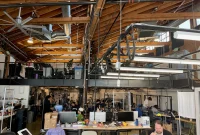Sequoia Partner Challenges Venture Capital Assumptions at TechCrunch Disrupt 2025
Venture Capital as a Distinct Asset Class
At the recent TechCrunch Disrupt 2025 event, Roelof Botha, managing partner at Sequoia Capital, made a compelling case against conventional wisdom regarding venture capital. He asserted that the sector should not be viewed merely as an asset class, emphasizing that increasing monetary investment in Silicon Valley does not equate to the creation of superior companies.
The Nature of Venture Investments
During a keynote interview on the main stage, Botha articulated his perspective on venture investments, stating, "Investing in venture is a return-free risk." He referenced established financial models to highlight the distinctiveness of venture capital. “Those familiar with capital asset pricing models recognize the irony in this approach,” he explained.
Botha underscored that the historical performance of venture capital has shown it operates independently from other asset classes. He noted that many institutional investors see value in allocating a portion of their portfolios to venture capital, presuming that increased funding would yield a higher number of successful companies. However, Botha challenged this assumption, suggesting that a saturation of funding could actually stifle the growth of exceptional companies.
The Growth of the Venture Capital Landscape
Botha pointed out that the number of venture firms in the United States has surged from approximately 1,000 when he joined Sequoia two decades ago to around 3,000 today. This notable increase raises questions about the efficacy of funding strategies in creating standout companies.
Reflecting on the evolution of technology during his tenure, Botha noted, “When I joined Sequoia in 2003, mobile devices were non-existent, and cloud computing was yet to emerge. At that time, there were about 300 million internet users globally.” He emphasized that today’s opportunities are unprecedented, citing that there have been around 380 outcomes valued over a billion dollars in the last 20 years—roughly 20 per year. However, he expressed skepticism about the sustainability of this trend simply through increased financial injections.
Conclusion: Rethinking Venture Funding Strategies
Botha’s insights at TechCrunch Disrupt 2025 challenge the status quo, encouraging investors to reconsider their approaches to venture funding. His arguments highlight the complexities of the venture landscape and suggest that merely enhancing financial investment may not be the solution for fostering remarkable companies in an increasingly crowded market.
This dialogue contributes to ongoing discussions in the venture capital industry, urging stakeholders to innovate their funding strategies and focus on nurturing the limited number of truly exceptional companies in today’s evolving technological landscape.




